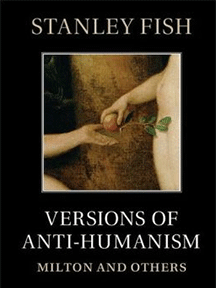By Louis J. Kern
Incorporating unpublished material and new essays by a leading critic of John Milton and a consideration of four metaphysical poets—George Herbert, Ben Jonson, Andrew Marvell, and John Donne—as well as Thomas Hobbes’ Leviathan (1651), Fish argues that the task of interpretation is simply that of identifying the intent of the author (intentionalism), and for those authors considered that intent can only be read in the light of pre-modern cultural conditions. His title is intentionally provocative but it signals the core of his argument, which is that these writers rejected reason and empiricism as the ultimate grounds of truth.
Fish is fundamentally concerned with epistemological and ontological issues. Each of the figures he considers adopts a Neo-Platonic idealist conception of a transcendent, universal truth, albeit one differentially represented in their literary productions. At the same time, they remain profoundly conflicted since they desire recognition and distinction as unique mediums of perception and expression of that truth. This sets up an ironic dialectical struggle in which individuals seek the suppression or erasure of the self to prioritize the truth while simultaneously seeking humanistic eminence.
For Milton and Herbert the human dilemma is expressed in theistic terms; both seek permanence and stability in a transitory world through unquestioning faith. But for Herbert the result is the absorption of the self by God (man as the embodiment of divine order and power), while for Milton it is antinomian—the rejection of positive law and public morality by one directly under God’s direction. Jonson and Marvell, products of courtly life, seek to dissolve the superficialities of titles and offices and the privileging of consciousness—linear and reflexive thought. For both, the texts of their poems become transparently empty of internal or external referents. For Jonson this leads to a desire to establish a counter society of virtue (“the Tribe of Ben”), while Marvell seeks the disappearance of the self in order to prevent its social appropriation. Donne and Hobbes, both distrustful of human nature, seek power over chaos—Donne through a poetics of “masculine persuasive force” and Hobbes by establishing a “Mortall God,” substituting a timor tyrannei for a timor dei. Donne’s quest for verbal mastery overwhelms his pursuit of the independent, “real” self. For Hobbes, the private is dissolved in the public; all values—conscience, justice, morality, freedom are unnatural, products of social convention that can only be sustained by individual submission to the centralized power of the state.
We thus have come full circle, from Milton’s need for absolute submission to the divine to Hobbes’ requirement of the subject’s absolute submission to the ruler. Both are motivated by the same fears of uncertainty, insecurity, anarchy, and licentiousness; both view human free will as a dangerous condition. Given this analysis, Fish is critical of a modern historicism that wants to read liberalized Enlightenment ideas back into seventeenth-century texts. Critically, he adopts a take-no-prisoners approach to virtually all forms of postmodernist literary theory from Structuralism to Cultural Studies.
Fish’s treatment of Milton carries the greatest conviction as it emerges from a penetrating, comprehensive understanding of Puritan theology. The discussion of other figures is subtler and more rarefied though thematically consonant. In light of the acute perspicuousness of Fish’s argument, highlighting the contest of free will and individuality versus faith and submission, the volume is less an anatomy of antihumanism and more a testament to Nietzsche’s observation that pace aeterna veritas meditation on things human can ease life’s burdens (Human, All Too Human, 1878, maxim 35).
Louis J. Kern (ΦBK, Clark University,1965) is professor emeritus of history at Hofstra University. Hofstra University is home to the Omega of New York chapter of Phi Beta Kappa.




